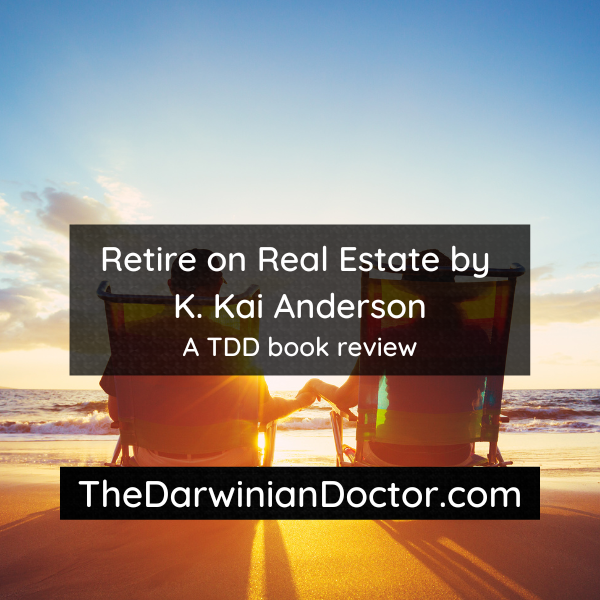This is a review of the book “Retire on Real Estate” by K. Kai Anderson.

I’ve been splurging a little recently on books from Amazon. In keeping with my real estate obsession, my next book review is “Retire on real estate” by K. Kai Anderson.
This book review contain affiliate links.
The premise of this book is simple: Secure the retirement of your dreams by securing cash flowing rental real estate.
- Category: Real estate investing
- Sub-category: Personal finance and investor mindset
- Author: K. Kai Anderson
Anderson has over a decade of real estate investing experience. More importantly, she has a simple, relatable writing style and a cute way of thinking about real estate.
Part one: The egg


In the early part of her book, Anderson outlines some serious flaws with the concept of the “nest egg”. Currently, most Americans try to sock away enough money in their 401(k) plans to create a big nest egg and live comfortably in retirement.
But the nest egg is fragile and prone to cracking, she writes.
The nest egg retirement plan has the risks of:
- Running out of money
- Underfunding
- Stock market fluctuations
- Unscrupulous financial advisors
- Plan fees, etc, etc…
Instead of a fragile nest egg, Anderson recommends buying a “chicken”. The chicken, of course, is rental property.
The benefits of owning a “chicken” (AKA rental property)


Anderson makes a strong case for the benefits of rental property. These are similar to the ones outlined in my post introducing why I’ve chosen to go the real estate route myself.
- Cash flow
- Lower income taxes
- A hedge against inflation
- Diversification of assets beyond retirement accounts
She lists the risks of owning rental real estate:
- Bad tenants
- Plunging property values
- Risk of vacancy
- Risk of costly repairs
She calls these risks overblown and backs it up with her decade of experience.
Part two: The Nest


This section is dedicated to building up the financial discipline and capital required to purchase real estate. She calls it “preparing the nest.”
It is a good mix of motivation and common sense. I came away inspired to save money and with a great acronym for successfully achieving your goals.
Make Goals “SMART” for success
S – specific
M – meaningful
A – action-oriented
R – realistic
T – time-specific
Part three: The Chicken


This is the section that goes over various strategies to get started in real estate.
Some highlights include:
- Renting out part of your house
- Moving and keeping your first house as a rental property
- Extract cash from your house via a HELOC or refinance
- 401(k) loans
While I enjoyed this section, I didn’t love the idea of taking loans from your 401(k). This seems like taking your nest egg and dangling it over concrete. Too risky for my blood!
My thoughts
This is the perfect book for someone just starting to consider “alternative” investment into real estate. Anderson aptly pokes holes into the strategy of relying solely on your 401(k) in retirement, and presents rental real estate as an appealing way to supplement your retirement.
Like a chicken, rental real estate will produce ongoing returns for the life of the investment.
Nest eggs, on the other hand, are fragile and prone to cracking.
For me, this book was a confirmation of my mindset. So while I enjoyed reading the book, it didn’t evoke the same “come to Jesus” feeling that I felt while reading “The Richest Man in Babylon” or “Rich Dad, Poor Dad.”
Next up in book reviews: The Simple Path to Wealth by J L Collins
Have a great week!
— TDD
Want to support the blog?
- Join our investor club at Cereus Real Estate
- Visit my Recommendations page
- Check out my wife’s food blog: Eat Dessert First
- Stay at our luxury short term rentals
- Check out my TikTok channel
- Follow me on Instagram
- Follow me on YouTube
- Contact me with questions



3 comments
I agree with the principles of the book as well though I have never heard or read it before.
Real estate has its downsides but for the most part being able to generate positive cash flow without consuming the asset itself is what makes it so appealing to me.
Thanks for the review. Based on what I heard on a recent podcast, I’m considering reducing my contributions to my 401k (after maxing out for almost 20 years) and diverting the money to real estate. Is that what you’ve done?
Luckily I’ve been able to continue fully funding my 401k despite my real estate investing. Especially early on in your real estate investing career, that’s the safe and conservative move for sure. If you’re pretty confident you’ll end up committing to real estate, I think it’s reasonable to rely on real estate to be your retirement fund. Many would call this risky, though.